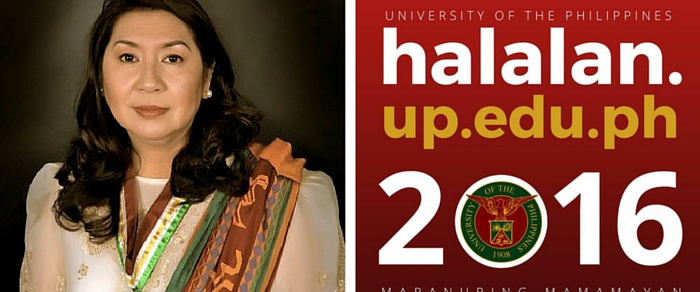 Photo: Left, Professor Aileen Baviera of the UP Asian Center. Right: Social media promotional materials for UP's Halalan website.
Photo: Left, Professor Aileen Baviera of the UP Asian Center. Right: Social media promotional materials for UP's Halalan website.
In a commentary published in UP’s Halalan website, Professor Aileen Baviera of the UP Asian Center argued for the need to evaluate the foreign-policy platform of the presidential candidates in the 2016 elections. Who among them, she asks, understands -- and thus address effectively -- the enormity of the Philippines’ foreign-policy challenges?
Her commentary, “Presidential Elections and the Country’s Foreign Policy,” identifies two such major challenges. On the one hand is China, “a key protagonist and our major adversary in the single most challenging external security concern of the country at present – the territorial and maritime disputes in the West Philippine Sea.”
On the other is “the role we [The Philippines] want the United States to play in our region and with respect to our national aspirations.” This at a time when the US, despite its formidable military power, faces a myriad of issues: the Islamic State, a rising Russia, domestic politics, and an arguably decreasing leadership in global affairs, among others.
Also in the commentary, Professor Baviera speaks of “the downside of having presidents who lacked an understanding of statecraft.” And she notes of cases in the past when our foreign policy was that of “muddling through,” which is something that “we can no longer afford to do” today.
Faced with the growing complexity of international relations, Filipinos, she argues, “deserve leaders who will know how to interact with other leaders and governments in order to serve the best interests of the nation, without getting us deeper into conflict or injecting major uncertainties into already complex regional relations.”
Read the entire essay: Presidential Elections and the Country’s Foreign Policy
The commentary was originally published by the Asia Pacific Pathways to Progress Foundation, Inc. and was posted on the UP Halalan website, www.halalan.up.edu.ph, managed by the University of the Philippines and devoted to helping educate and prepare Filipinos for the upcoming national elections.
Dr. Aileen SP. Baviera is Professor at the Asian Center, University of the Philippines Diliman. She completed her Ph.D. in Political Science at the University of the Philippines Diliman. Dr. Baviera specializes on and writes about contemporary China studies, China-Southeast Asia relations, Asia-Pacific security, territorial and maritime disputes, and regional integration. The editor in chief of the journal, "Asian Politics & Policy," she is also author of many academic publications, including “Territorial and Maritime Jurisdiction Disputes in East Asia: Comparing Bilateral and Multilateral Approaches,” a chapter that appeared in "Bilateralism, Multilateralism and Asia-Pacific Security: Contending Cooperation" published in 2013 by Routledge. View here complete faculty profile.
The Asian Center offers M.A. degrees in Asian Studies with four fields of specialization: Northeast Asia, Southeast Asia, South Asia, and West Asia. The Center also has an M.A. program in Philippine Studies that allows students to major in Philippine society and culture, Philippine foreign relations, or Philippine development studies. The Center offers a Ph.D. program in Philippine Studies in conjunction with the College of Arts and Letters and the College of Social Sciences and Philosophy. For an overview of these graduate programs, click here. The Asian Center also publishes Asian Studies: Journal of Critical Perspectives on Asia, the latest issue of which can be downloaded at the journal's website. View recent and upcoming Lectures & Conferences and read other News & Announcements.Join our mailing list to receive invitations to lectures, conferences, etc.

